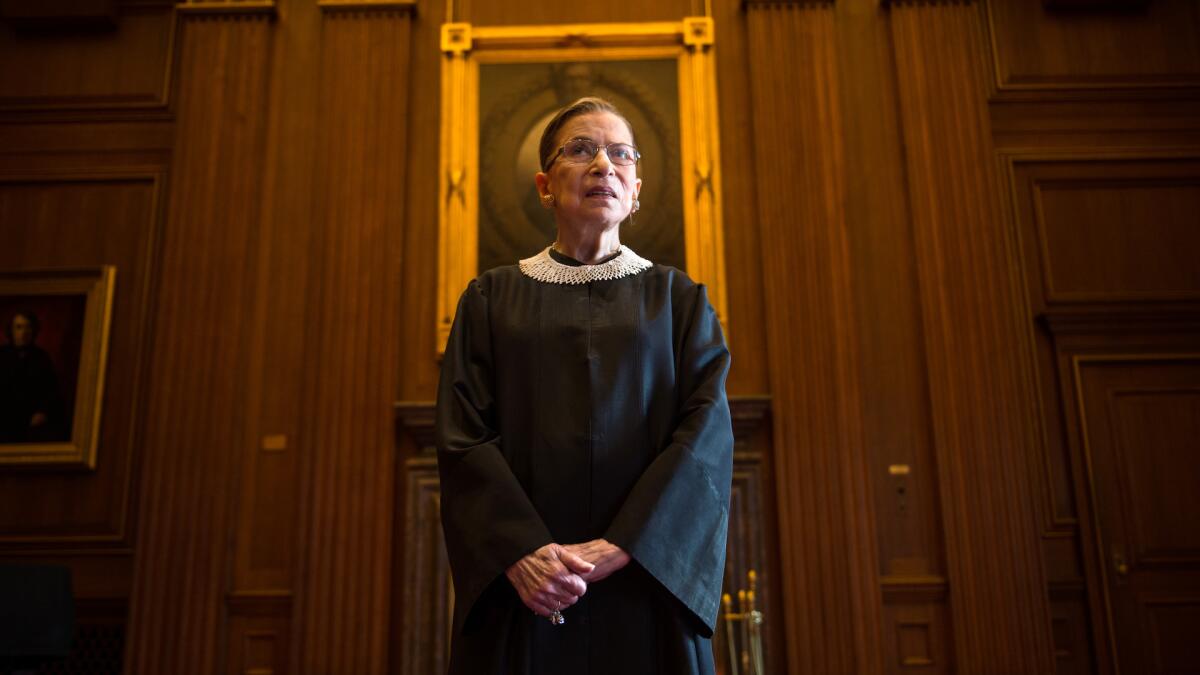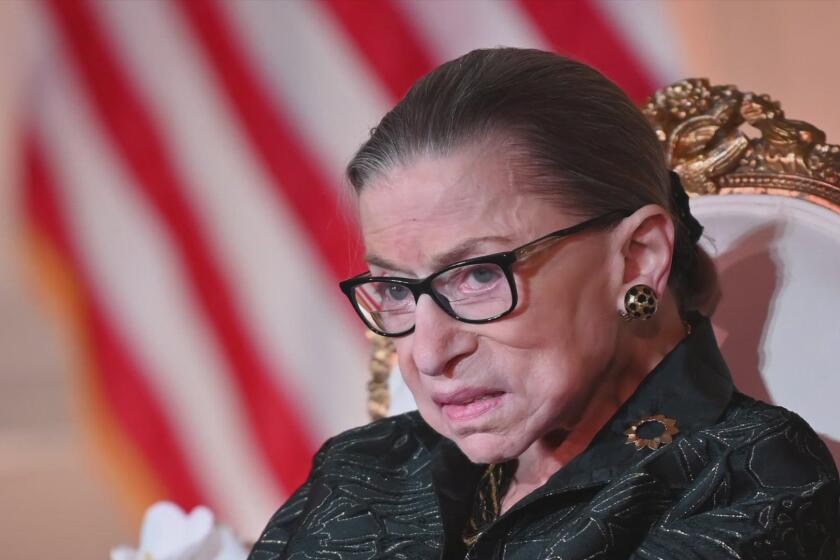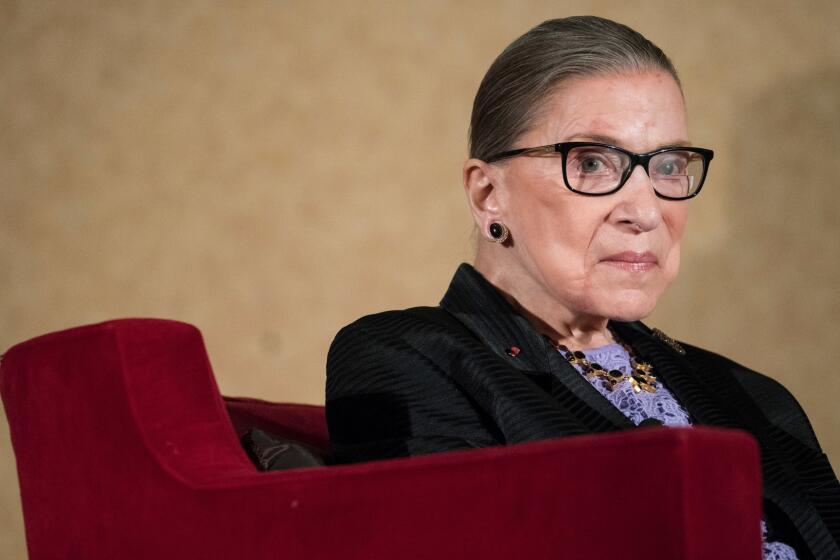McConnell vows to fill Ginsburg’s seat, thrusting court to center of 2020 presidential race

- Share via
The death of Justice Ruth Bader Ginsburg on Friday turned a theoretical debate over the U.S. Supreme Court into a battle of the highest and most significant political order.
Coming just 46 days before the Nov. 3 presidential election, the passing of the 87-year-old jurist and liberal stalwart ensures the court and its sway over the daily lives of Americans will be a front-and-center campaign issue like no other.
For the record:
8:10 p.m. Sept. 18, 2020A previous version of this story said Harry Reid was Democratic Senate majority leader during the fight over Merrick Garland’s nomination. He was Senate minority leader.
The battle lines were clear and immediate.
Democrats, stunned and bereft, cited recent precedent and argued that Republicans who control the Senate must hold off approving a successor until voters have the chance to weigh in less than two months from now.
But Senate Majority Leader Mitch McConnell said the GOP would press ahead with filling the vacancy and vowed to bring President Trump’s nominee to a vote on the Senate floor — though he did not say whether that would come before or after the election.
Justice Ruth Bader Ginsburg was the second woman to serve on the Supreme Court and the first to become a pop culture icon.
Trump was campaigning in Minnesota when Ginsburg’s death was announced. As he talked about the next president appointing up to four justices, someone in the crowd shouted, “Ginsburg is dead!” Trump didn’t seem to hear and kept on talking.
Afterward, still unaware, he spoke to reporters before boarding Air Force One for a flight home to Washington. “She just died. Wow. I didn’t know that,” Trump said. “She led an amazing life.”
Later, Trump praised her in a gracious formal statement.
“Renowned for her brilliant mind and her powerful dissents at the Supreme Court, Justice Ginsburg demonstrated that one can disagree without being disagreeable towards one’s colleagues of different points of view,” Trump said. “May her memory be a great and magnificent blessing to the world.”
He said nothing about a possible successor.
Biden, after landing in Delaware following a day of campaigning in Minnesota, joined other Democrats in insisting there be no selection or vote on a successor before election day.
“We should focus on the loss of the justice and her enduring legacy,” he told reporters in Wilmington. “But there is no doubt — let me be clear — that the voters should pick the president and the president should pick the justice for the Senate to consider.”
Ginsburg reportedly made her preference known in the days before her passing. As her strength waned, NPR reported, the justice dictated this statement to her granddaughter Clara Spera: “My most fervent wish is that I will not be replaced until a new president is installed.”
In seeking a delay, Biden and other Democrats cited the precedent set by McConnell in 2016 after conservative Justice Antonin Scalia died suddenly in February of that election year.
President Obama nominated Merrick Garland, a well-regarded federal appeals court judge, but McConnell said voters should have a say in replacing Scalia, and he declined to schedule a vote or even hold hearings on Garland’s nomination. Trump filled the vacancy with conservative appeals court judge Neil M. Gorsuch after taking office.
“The American people should have a voice in the selection of their next Supreme Court Justice,” Senate Minority Leader Charles E. Schumer of New York said on Twitter. “Therefore, this vacancy should not be filled until we have a new president.”
The leading candidate to replace Ginsburg is U.S. Circuit Judge Amy Coney Barrett, a former law clerk for Scalia and a longtime law professor at the University of Notre Dame.
Trump nominated her to a seat on the 7th Circuit Court of Appeals in Chicago and had previously interviewed her when he was in the process of selecting jurists to replace Scalia and, later, Justice Anthony M. Kennedy. White House lawyers said then that they expected Barrett would be nominated if Ginsburg were to die in office.
The Supreme Court consists of five conservative-leaning members and four who are more moderate to liberal. Replacing Ginsburg with another conservative justice could cement a rightward tilt for generations to come, with significant results.
In a year that has produced an onslaught of the unexpected, Ginsburg’s death — though not altogether surprising, given her age and ill health — came as a seismic shock. It was the kind of news that stopped people in their tracks and threw jaws wide open.
Shortly after it was announced, Greg Schultz, a senior advisor to Biden’s campaign, tweeted, “THIS ELECTION IS THE MOST IMPORTANT ELECTION EVER.”
Hyperbole aside, few in the heat of the moment were inclined to disagree.
“The polarization in this election was already a 12 on a 1-to-10 scale,” said Neil Newhouse, a Republican pollster. “This pushes it to about 15.”
Mindful of those stakes, both sides claimed the fight to fill Ginsburg’s seat would work to their partisan benefit.
“As a political matter this motivates Democrats far more than Republicans,” said Adam Jentleson, an advisor to former Sen. Harry Reid of Nevada, the Democratic minority leader during the fight over Garland’s nomination. “We are newly radicalized on judges.”
But Republican strategist Alex Conant insisted Trump and the GOP would benefit from what promises to be a fearsome battle, waged from Capitol Hill to the farthest-flung battleground states.
“A day ago this election was a referendum on Trump and his handling of COVID,” Conant said. “Now it’s going to be a referendum on the Supreme Court.”
Despite recent history, McConnell suggested there was no contradiction in pressing ahead with Ginsburg’s replacement.
“In the last midterm election before Justice Scalia’s death in 2016, Americans elected a Republican Senate majority because we pledged to check and balance the last days of a lame-duck president’s second term,” he said. “We kept our promise.”
“By contrast, Americans reelected our majority in 2016 and expanded it in 2018 because we pledged to work with President Trump and support his agenda, particularly his outstanding appointments to the federal judiciary. Once again, we will keep our promise,” McConnell said.
However, at least two Republicans could break party ranks, complicating McConnell’s efforts and Trump’s hopes of appointing his third justice to the high court, after Gorsuch and Brett M. Kavanaugh.
Sen. Lisa Murkowski of Alaska told Alaska Public Media on Friday before Ginsburg died that she would not support confirming a justice so close to an election.
“I would not vote to confirm a Supreme Court nominee. We are 50-some days away from an election,” she said, adding that she was using the same justification McConnell used in 2016.
Maine Sen. Susan Collins, enmeshed in a stiff reelection battle in good part because of her vote to seat Kavanaugh, told the New York Times last month that she would not seat a justice in October, calling it “too close” to November’s election. She issued a statement Friday night mourning Ginsburg’s death but saying nothing about her potential successor.
Though several Republicans have said this year that they would hypothetically support moving a nomination before an election, it is unclear whether enough of them will actually do so.
McConnell can afford to lose no more than three of his 53 Republicans, which would require Vice President Mike Pence to break a tie.
One lawmaker expected to play a high-profile role in the political fight is Biden’s running mate, California Sen. Kamala Harris, who sits on the Senate Judiciary Committee.
The senior Democrat on the committee, which will hold hearings on a Supreme Court nominee, is California’s other senator, Dianne Feinstein.
Justice Ruth Bader Ginsburg, who championed women’s rights and was the second woman to serve on the Supreme Court, has died at 87.
As Collins’ closely watched actions suggest, Ginsburg’s death will also roil the battle for control of the Senate, putting fresh pressure on Republicans in tough reelection races, including contests in Georgia, North Carolina and Montana.
Republican Sen. Joni Ernst, facing a difficult reelection fight in Iowa, sent a fundraising email bluntly stating what is likely to be Republicans’ argument in the presidential and Senate campaigns this fall.
With the subject line, “BREAKING: The future of the Supreme Court is on the line,” the email cited guns, abortion and border policy and said, “If conservatives fail to protect the White House and the Senate majority in November, we will place the power of the next nominee into the Left’s hands.”
Showing the sensitivity of the matter, Ernst soon retracted the fundraising solicitation and apologized.
“This email never should have gone out,” she said in a statement to Radio Iowa. “Though I never saw it, it was sent out under my name and I take responsibility for it. Tonight, my prayers are with the family of Justice Ginsburg.”
Barabak reported from San Francisco and Hook from Portland, Maine. Times staff writers David Savage, Jennifer Haberkorn, Chris Megerian and Sarah D. Wire in Washington and Seema Mehta in Grand Rapids, Mich., contributed to this report.
More to Read
Get the L.A. Times Politics newsletter
Deeply reported insights into legislation, politics and policy from Sacramento, Washington and beyond. In your inbox three times per week.
You may occasionally receive promotional content from the Los Angeles Times.














